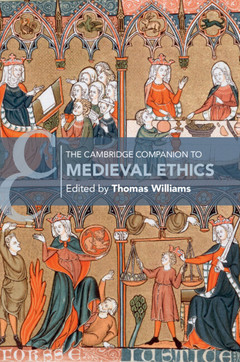Description
The Cambridge Companion to Medieval Ethics
Cambridge Companions to Philosophy Series
Coordinator: Williams Thomas
Offers historical and topical chapters on the whole range of medieval ethical thought in Christian, Jewish, and Islamic philosophy.
Language: English
Subject for The Cambridge Companion to Medieval Ethics:
The Cambridge Companion to Medieval Ethics
Publication date: 12-2018
426 p. · 15.2x22.8 cm · Paperback
Publication date: 12-2018
426 p. · 15.2x22.8 cm · Paperback
The Cambridge Companion to Medieval Ethics
Publication date: 12-2018
350 p. · 16x23.5 cm · Hardback
Publication date: 12-2018
350 p. · 16x23.5 cm · Hardback
Description
/li>Contents
/li>Biography
/li>
Ethics was a central preoccupation of medieval philosophers, and medieval ethical thought is rich, diverse, and inventive. Yet standard histories of ethics often skip quickly over the medievals, and histories of medieval philosophy often fail to do justice to the centrality of ethical concerns in medieval thought. This volume presents the full range of medieval ethics in Christian, Islamic, and Jewish philosophy in a way that is accessible to a non-specialist and reveals the liveliness and sophistication of medieval ethical thought. In Part I there is a series of historical chapters presenting developmental and contextual accounts of Christian, Islamic, and Jewish ethics. Part II offers topical chapters on such central themes as happiness, virtue, law, and freedom, as well as on less-studied aspects of medieval ethics such as economic ethics, the ethical dimensions of mysticism, and sin and grace. This will be an important volume for students of ethics and medieval philosophy.
Introduction Thomas Williams; Part I. History: 1. From Augustine to Eriugena Erik Kenyon; 2. From Anselm to Albert the Great Ian Wilks; 3. From Thomas Aquinas to the 1350s Eric W. Hagedorn; 4. Islamic ethics Jon McGinnis; 5. Ethics in medieval Jewish philosophy T. M. Rudavsky; Part II. Concepts and Themes: 6. Happiness Jeff Steele; 7. Virtue Thomas M. Osborne, Jr; 8. Law Jean Porter; 9. Freedom without choice: medieval theories of the essence of freedom Tobias Hoffmann; 10. Practical reasoning M. V. Dougherty; 11. Will and intellect Thomas Williams; 12. Emotions Martin Pickavé; 13. Medieval Islamic and Christian mysticism and the problem of a 'mystical ethics' Amber Griffioen and Mohammad Sadeg Zahedi; 14. Economic ethics Roberto Lambertini; 15. Self-interest, self-sacrifice, and the common good John Marenbon; 16. Sin and grace Eileen Sweeney.
Thomas Williams is Professor of Philosophy at the University of South Florida. He has published widely on figures including Anselm, Duns Scotus, Augustine, and Aquinas, and he is the editor of The Cambridge Companion to Duns Scotus (Cambridge, 2003) and Thomas Aquinas: Disputed Questions on the Virtues (Cambridge, 2005).
© 2024 LAVOISIER S.A.S.




